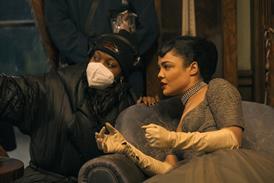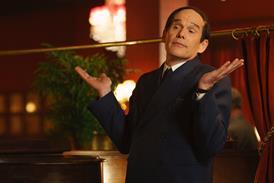BEST ACTRESS/BEST SUPPORTING ACTRESS
It's been a rich year for actresses, but Julia Roberts is the only dead cert for a best actress nomination. Meanwhile, in the supporting actress category, the British are sure to make their now traditional appearance. Mike Goodridge reports.
She was Oscar-nominated for her second starring role and her third, but Julia Roberts has had to wait 10 years and another 19 films before her third. And there can be nothing more certain that Roberts, probably the world's biggest box office star, will snag a best actress Academy Award nomination for Erin Brockovich.
She'll probably walk away with the prize itself, unless some serious rallying from other studios comes into play on behalf of their performers.
Roberts has already been named best actress of 2000 by the National Board Of Review Of Motion Pictures and should snag other critics' honours before almost inevitable nominations for the Golden Globe and the Bafta as well as the Oscar.
Why such certainty' Even though the film was released in March, her hugely charismatic, screen-chewing turn as the real-life crusader Brockovich was so intrepid, convincing and unlike anything else that the romantic comedy queen has done that critics roared with approbation. Besides, it's clearly Roberts' turn. After a lull in the mid-1990s, she has re-established herself as the undisputed queen of the box office - even Erin Brockovich took over $100m -and the Academy always loves a good actor who also sells tickets. Pundits have been tipping Roberts since the film opened and nothing quite so spectacular as her work in this film has emerged in subsequent months.
Is hers the best performance of the year by an actress in a leading role' Probably not, but then again it was the best performance of the year by a giant movie star in a much-liked hit film.
If voters of every age embrace Erin Brockovich, only a fraction will stomach Requiem For A Dream, Darren Aronofsky's resolutely uncompromising adaptation of Hubert Selby Jr's novel about the horrors of drug addiction. But amid the carnage of self-destruction that will turn off many is a performance by Ellen Burstyn, which could be the best in any year - by man or woman. As an ageing, lonely woman who gets hooked on diet pills in order to slim down for an appearance on a TV quiz show, Burstyn is mesmerising. Her descent into madness - accompanied by hallucinations and withdrawal from the world - is what makes the film so heartbreaking and ultimately accessible to those who can't relate to the addictions of the younger characters.
Although she's acted steadily since her heyday in the 1970s, Burstyn's role in this film, as well as a stand-out supporting performance in James Gray's The Yards and the hit re-release of The Exorcist, have catapulted her back into the public eye. Burstyn is no stranger to awards. She has five Oscar nominations under her belt and one Oscar - for Alice Doesn't Live Here Anymore in 1974. Her other nominations were for The Last Picture Show (1971), The Exorcist (1973), Same Time Next Year (1978) and Resurrection (1980).
Burstyn's experience contrasts starkly with another frontrunner, Icelandic pop diva Bjork who made her film acting debut in Lars von Trier's bravura musical melodrama Dancer In The Dark. Von Trier hired her for the role of his Czech immigrant single mother working in a factory in a small town in rural Washington state after seeing her in Spike Jonze's music video for her song It's Oh So Quiet. And despite the conflict of personalities which existed between the two on set, his judgement that she was perfect for the part proved right. Bjork threw herself into her character Selma with an abandon rarely seen even in the most courageous of actresses. As Selma starts to lose her sight and struggles to save money for an operation that will save her son from the same fate, she was natural and appealingly stubborn. After committing murder to recover the money when it is stolen, she was captivating to watch. And when she faces the death penalty, her combination of resignation to her fate and despair was devastating to watch.
Critics may have been divided about the film itself but Bjork received unanimous acclaim, winning the best actress prize at Cannes and the European Film Award. Last week she won a special recognition from the National Board Of Review for outstanding dramatic performance in a musical. For the star who claims that she won't act again, an Oscar nomination (maybe two if her song I've Seen It All gets one) could be persuasion enough for her to eat her words.
Laura Linney made a breakthrough in 1999 after a decade of solid work in studio films (The Truman Show, Primal Fear and Congo) and as Mary Ann Singleton in the popular Tales Of The City TV series. In You Can Count On Me Linney plays a single mother living in a small town in upstate New York whose routine life is thrown into turmoil when her restless brother arrives to stay with her and she is entirely believable. She makes writer-director Kenneth Lonergan's character come alive in the most effortlessly natural way, so that when her character makes irrational choices or pious decisions, she appears neither irrational or pious, but merely human. When the two siblings say goodbye at the film's end, Linney and Mark Rufalo have established such well-rounded characters that the farewell possesses an authentic poignancy rare to discover in contemporary film.
Linney also gives a memorable supporting performance as the deceitful Bertha Dorset in Terence Davies' film adaptation of Edith Wharton's The House Of Mirth, but that film is dominated, as is fitting since she barely leaves the screen for a moment, by Gillian Anderson. Best known as Agent Dana Sculley on TV's long-running The X-Files, Anderson is a revelation as Wharton's doomed heroine Lily Bart, initially a confident society woman, then later thrust into disgrace and poverty. The actress captures the various shades of this contradictory woman, struggling to choose between financial needs and the love of a man who cannot meet them. From her glamorous entrance to her final emotional breakdown, Anderson proves that she can hold her own on the big screen.
Juliette Binoche also stands a chance of awards recognition for her radiant performance as the chocolate-shop owner in Lasse Hallstrom's Chocolat. Binoche's charismatic characterisation helps to ensure that the film avoids sentimentality, while imbuing it with a warmth that will melt the hardest of hearts. Binoche, who won a best supporting actress Oscar for The English Patient in 1996, speaks flawless English in this film and should become a major star in the US on the back of it.
Possessing the same rare luminosity as Binoche is Cate Blanchett, already recognised as one of the world's premiere actors, who gives another outstanding performance this year in Sam Raimi's The Gift. Co-written by Billy Bob Thornton, Blanchett plays a psychic (based on Thornton's own mother) in a small Southern town whose abilities involve her in a murder investigation. The actress is better than the film itself, utterly believable as a widow protecting herself and her children from the criminal elements of the town and terrorised by her own gift.
It's a rich year for actresses and others could figure in the forthcoming awards rounds. Michelle Yeoh's glorious action heroine-in-love in Crouching Tiger, Hidden Dragon is the soul of the film, her humanity and good

















No comments yet